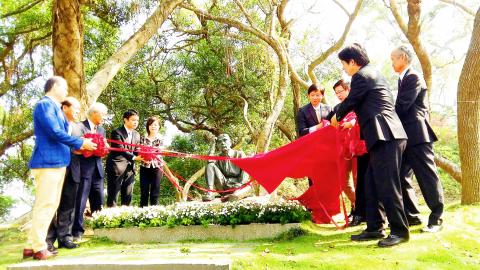Tainan Mayor William Lai (賴清德) yesterday attended the unveiling of a repaired statue of Japanese engineer Yoichi Hatta that was decapitated last month, saying Japan-Taiwan relations are now stronger.
Lai apologized to the Hatta family for the city’s failure to protect the statue and called the decapitation a test that revealed true feelings in both nations.
Members of Hatta’s family, who were also in attendance, thanked the city for its quick repair of the statue and said that Japan-Taiwan ties would not be affected.

Photo: Wang Han-ping, Taipei Times
The statue, located near Tainan’s Wushantou Reservoir (烏山頭水庫), honors Hatta, who is known as the “father of the Chianan Irrigation System” for his contributions to the development of irrigation during the Japanese colonial era.
The statue’s head was removed on April 15, allegedly by former Taipei city councilor Lee Cheng-lung (李承龍), who later told prosecutors he did not agree with the historical status afforded to Hatta.
The Chia-Nan Irrigation Association and the Chi Mei Museum cooperated to repair the statue, opting to use an identical replacement head when the original could not be found.
A commemorative ceremony for Hatta is to be held this afternoon, and is to be attended by his eldest grandson, Shuichi Hatta, and other family members, Japan-Taiwan Exchange Association Director-General Kinzo Nakagun, Kanazawa City Mayor Yukiyoshi Yamano and Kaga City Deputy Mayor Atsushi Kawai.
Association president Yang Ming-feng (楊明風) said the repaired statue would be well-protected and well-monitored with improved lighting and cameras.
“The water shortages we face these days really highlight the importance of Yoichi Hatta’s contributions to irrigation and the Wushantou Reservoir,” Yang said.
Meanwhile, city officials have expressed concern that statues of other historical Japanese figures might come under attack, such as that of Japanese colonial-era Tainan mayor Matao Hatori.
Hatori defied protests from fellow Japanese to reinstate Confucian rituals and repair Chihkan Tower (赤崁樓, formerly Fort Provintia), where a commemorative statue of him was later installed.
The city government requested police to step up patrols at all statue sites, saying that statues of some historical Taiwanese figures, such as Japanese colonial-era lawyer and 228 Incident hero Tang De-Jhang (湯德章) and Republic of China founder Sun Yat-sen (孫中山), might also become targets.
Police said they cannot enter historic sites at will, but have been in touch with Chihkan Tower security guards, advising them to be on the lookout for suspicious people.
One tour guide said statues of historical Japanese figures such as Hatta, Hatori and Goto Shinpei, who served as head of Taiwanese civilian affairs under Japanese rule, are popular among Japanese tourists.
Hatori is particularly notable for his protection of Taiwanese culture and artifacts such as Confucian rituals and the bell at Kaiyuan Temple in Tainan’s North District (北區), the guide said.
Additional reporting by Wang Chieh

‘DENIAL DEFENSE’: The US would increase its military presence with uncrewed ships, and submarines, while boosting defense in the Indo-Pacific, a Pete Hegseth memo said The US is reorienting its military strategy to focus primarily on deterring a potential Chinese invasion of Taiwan, a memo signed by US Secretary of Defense Pete Hegseth showed. The memo also called on Taiwan to increase its defense spending. The document, known as the “Interim National Defense Strategic Guidance,” was distributed this month and detailed the national defense plans of US President Donald Trump’s administration, an article in the Washington Post said on Saturday. It outlines how the US can prepare for a potential war with China and defend itself from threats in the “near abroad,” including Greenland and the Panama

A wild live dugong was found in Taiwan for the first time in 88 years, after it was accidentally caught by a fisher’s net on Tuesday in Yilan County’s Fenniaolin (粉鳥林). This is the first sighting of the species in Taiwan since 1937, having already been considered “extinct” in the country and considered as “vulnerable” by the International Union for Conservation of Nature. A fisher surnamed Chen (陳) went to Fenniaolin to collect the fish in his netting, but instead caught a 3m long, 500kg dugong. The fisher released the animal back into the wild, not realizing it was an endangered species at

The High Prosecutors’ Office yesterday withdrew an appeal against the acquittal of a former bank manager 22 years after his death, marking Taiwan’s first instance of prosecutors rendering posthumous justice to a wrongfully convicted defendant. Chu Ching-en (諸慶恩) — formerly a manager at the Taipei branch of BNP Paribas — was in 1999 accused by Weng Mao-chung (翁茂鍾), then-president of Chia Her Industrial Co, of forging a request for a fixed deposit of US$10 million by I-Hwa Industrial Co, a subsidiary of Chia Her, which was used as collateral. Chu was ruled not guilty in the first trial, but was found guilty

The Chinese Nationalist Party (KMT) is maintaining close ties with Beijing, the Democratic Progressive Party (DPP) said yesterday, hours after a new round of Chinese military drills in the Taiwan Strait began. Political parties in a democracy have a responsibility to be loyal to the nation and defend its sovereignty, DPP spokesman Justin Wu (吳崢) told a news conference in Taipei. His comments came hours after Beijing announced via Chinese state media that the Chinese People’s Liberation Army’s Eastern Theater Command was holding large-scale drills simulating a multi-pronged attack on Taiwan. Contrary to the KMT’s claims that it is staunchly anti-communist, KMT Deputy